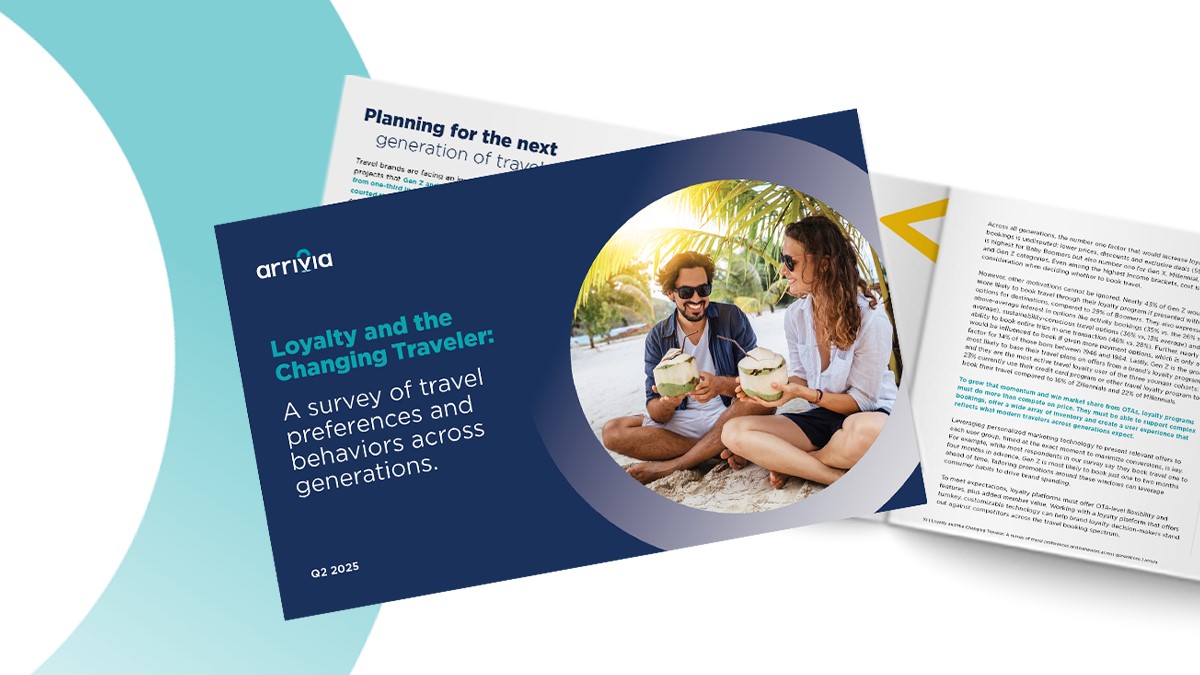The loyalty industry has skyrocketed in recent years, amassing a market size of $7.84 billion in 2021 and rapidly approaching $9.57 billion by the end of 2023. Loyalty programs within the industry span nearly every sector, from travel and hospitality to retail and finance, resulting in the average consumer belonging to nearly 17 loyalty programs at a single point in time.
However, for most consumers, access to more programs is not always better. The ensuing confusion between points versus miles and conflicting redemption options often prevents more than half of rewards perks from being used. But what if you could enable a truly frictionless reward system? By investing in blockchain technology for your travel loyalty rewards program, you can.
Blockchain technology enables seamless loyalty rewards tracking, increased customer trust, and efficient reward redemption with the promise of secure and tamper-proof transactions. As blockchain gains momentum among consumers, take a look at how travel industry professionals can adopt blockchain in loyalty programs to revamp and revolutionize the member experience.
Understanding Blockchain Technology and its Benefits for Loyalty Programs
Blockchain technology refers to an advanced data system that allows multiple transactions to be shared in a transparent business network. Each time a new transaction occurs—like a loyalty point is issued, redeemed, or exchanged—a unique token is created. Tokens are grouped into transaction blocks that are distributed across the network without the need for a centralized database.
So, what are the benefits of blockchain for loyalty? Blockchain loyalty programs are decentralized and have built-in mechanisms that prevent unauthorized transactions, creating what’s called an immutable ledger system. Loyalty programs that adopt blockchain offer heightened security for customer data and ward against fraudulent activity on behalf of scammers and hackers.
Blockchain in loyalty programs also allows for transparent, real-time transaction tracking, ensuring fair and accurate rewards distribution and redemption for program members. And because most consumers juggle a variety of loyalty programs—like air travel and accommodations—blockchain allows for instant transactions across multiple loyalty program currencies on a single network.
Blockchain Loyalty Programs in Action: KrisFlyer Membership
For an idea of how blockchain in loyalty programs works, look to the KrisFlyer Singapore Airlines Group rewards program. KrisFlyer allows members to earn and redeem miles across a variety of transactions, from buying Singapore Airlines flights to paying for purchases with the Kris+ lifestyle rewards app. Members can then mix miles and cash distributed throughout the program.
Think of it like this: Singapore Airlines credits a member’s rewards in the same digital wallet they earn points for Kris+ purchases in, like meals or apparel. Through a decentralized blockchain loyalty program, the KrisFlyer member can then redeem those points—both from travel and purchases—to book a hotel stay. It’s seamless and easy, helping to boost member satisfaction and program use.
Personalization and Decentralized Rewards Management with Blockchain
At first glance, ‘personalization’ and ‘decentralized’ seem like they don’t belong in the same sentence. After all, if member preferences are spread across a shared network, how can a loyalty program deliver personalized rewards? The key is through blockchain-based loyalty programs, which leverage smart contracts and decentralized rewards management for maximum impact.
Smart contracts refer to programs stored on a blockchain network that automate certain actions when specific conditions are met, like crediting a member their points for a recent purchase. Because smart contracts are reliant on member behavior, they enable travel brands to offer tailored travel rewards based on individual preferences, creating a more personalized loyalty experience.
Decentralization in blockchain technology transfers control and decision-making from a central database (like a travel provider) to a distributed network (like a shared loyalty program). A decentralized rewards management system empowers customers to have direct control over their loyalty rewards, including the ability to seamlessly redeem perks across multiple travel partners.
Personalization Powered by Blockchain: Delta and Starbucks
For examples of travel brands that have leveraged blockchain to provide personalized rewards and decentralized management in loyalty rewards programs, look no further than Delta Air Lines. In October 2022, Delta announced a partnership between their SkyMiles loyalty program and the popular Starbucks Rewards program, which doubles members’ current benefits.
Once members link their Delta SkyMiles and Starbucks Rewards accounts—accounts that are securely connected by blockchain technology—they can earn 1 mile for every $1 spent at Starbucks. Members also earn Starbucks ‘Double Star’ rewards on days they travel with Delta and receive access to exclusive offers that are tailored to their dual-membership purchase behavior.
Data Security and Customer Trust in Blockchain-Backed Loyalty Programs
Blockchain-based loyalty platforms are significantly more secure than traditional loyalty programs housed in a centralized database. Unlike traditional programs, blockchain’s encrypted and distributed nature enhances data security, creating a time-stamped entry of every transaction ever made. It protects against fraud, double-spending, and other types of transaction manipulation.
Likewise, the inclusion of smart contracts in blockchain-based loyalty platforms allows for seamless compliance with data regulations, such as the California Consumer Privacy Act (CCPA). Combined with the assurance that user personal information is protected, blockchain’s transparency builds trust between travel brands and customers, promoting long-term loyalty program participation.

Trust in Blockchain-Backed Transactions: American Airlines
Are you wondering, ‘What companies use blockchain for loyalty programs?’ If so, you’d be surprised to learn that most major travel providers adopt blockchain to power their loyalty programs, including American Airlines, one of the most recognized travel brands in the world. Its AAdvantage frequent-flyer program has numerous loyalty programs connected through blockchain, including:
- Miles on American Airlines flights
- Miles on Oneworld Partner Airlines flights
- Points on AAdvantage credit card purchases
- Points on Bilt Rewards credit card purchases
- Points on World of Hyatt, Marriott Bonvoy, IHG Rewards Club hotel stays
- Points on Shell Fuel Rewards purchases
With more than 115 million members, AAdvantage is the largest loyalty program in the world—and it’s based on blockchain! So, you truly do not have to worry about consumer security when it comes to blockchain technology. Through blockchain-based platforms, travel bands can enhance data protection and transparency, all while increasing customer trust and traveler wallet share.
The Future of Travel Rewards: Tokenization and Cross-Platform Integration
Each year sees new innovations in travel loyalty programs, and blockchain is at the heart of several. One such innovation is the tokenization of loyalty rewards. Tokenizing loyalty rewards on the blockchain allows customers to exchange loyalty points for digital tokens that can be used across various travel partners and platforms, like redeeming Starbucks points for Delta SkyMiles miles.
The cross-platform integration made possible by blockchain technology enables seamless loyalty experiences for travelers and loyalty program members. Customers are able to redeem loyalty rewards seamlessly across different travel services, such as airlines, hotels, and car rentals. This function ultimately maximizes convenience for members, boosting satisfaction and engagement.
Similarly, cross-platform integration enables travel providers to potentially increase customer lifetime value (CLV) through the addition of various services on a single platform. Rather than book a flight and toggle to a separate provider for a rental car or hotel, a blockchain-based platform allows members to utilize their accumulated points and miles with a single provider.
Arrivia: Pioneering Travel Rewards Programs
Despite blockchain making waves across the loyalty industry, there are a few key considerations before adopting a blockchain-based system. For one, it’s paramount to select a suitable blockchain platform to guarantee adequate data security. Likewise, you must ensure compliance with all relevant data regulations and educate your members about blockchain-based loyalty benefits.
When you begin to craft a loyalty network that drives an engaging experience for your program members, consult the experts at arrivia. As the leading loyalty rewards program partner for some of the world’s most respected cruise, hotel, resort, and financial brands, arrivia is at the forefront of travel technology.
Request a demo today to learn how arrivia can help shape the future of loyalty!




